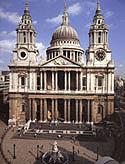The Sonnini Manuscript
While we do not dispute the early entrance of Christianity into Britain, we at the Saxon Messenger do look quite sceptically upon the validity of the Sonnini Manuscript. In fact, we are certain that it is spurious. It is nevertheless presented here for informational purposes.
The Sonnini Manuscript
There is convincing evidence from highly credible sources that Britain received the good news of the Kingdom of God direct from Palestine within a few years of the Crucifixion. Some of the apostles -- Paul in particular -- visited Britain. The antiquity of the ancient British Church, never in any degree subordinate to Rome, has been established beyond doubt. The firm Glastonbury tradition that Joseph of Arimathea and his companions formed there the first Christian community in Britain is substantially supported. John Keyser |
The Sonnini Manuscript, translated from the Greek by C.S. Sonnini from an original manuscript found in the archives of Constantinople, was presented to him by the Sultan Abdoul Achmet.
Sonnini was traveling in the Middle East during the reign of Louis XVI -- who held the French throne from 1774 to 1793. He published his travels, in French, between those two dates and after his discovery of the manuscript. The manuscript itself was translated into English and published sometime late in 1799 and was available -- at the earliest -- sometime around 1800.
The manuscript was found interleaved in a copy of Sonnini's Travels in Turkey and Greece, and purchased at the sale of the library and effects of the late Right Hon. Sir John Newport, in Ireland, whose family arms are engraved on the cover of the book. This book had been in the possession of the family for more than thirty years -- along with a copy of the firman of the Sultan of Turkey, granting to C.S. Sonnini permission to travel in all parts of the Ottoman dominions.
The following is the contents of the title page of Sonnini's work, in which the English translation of the document was found: "Travels in Turkey and Greece undertaken by order of Louis XVI, and with the authority of the Ottoman Court, by C.S. Sonnini, member of several scientific or literary societies of the Society of Agriculture of Paris, and of the Observers of Men. 'Mores multorum videt et ubes.' -- Hor., London: Printed for T.N. Longman and O. Rees, Paternoster Row, 1801."
Verse 1: And Paul, full of the blessings of Christ, and abounding in the spirit, departed out of Rome, determining to go into Spain, for he had a long time purposed to journey thitherward, and was minded also to go from thence into Britain.
Verse 2: For he had heard in Phoenicia that certain of the children of Israel, about the time of the Assyrian captivity, had escaped by sea to "the isles afar off," as spoken by the prophet, and called by the Romans Britain.
Verse 3: And the Lord commanded the gospel to be preached far hence to the Gentiles, and to the lost sheep of the House of Israel.
Verse 4: And no man hindered Paul; for he testified boldly of Jesus before the tribunes and among the people; and he took with him certain of the brethren which abode with him at Rome, and they took shipping at Ostium, and having the winds fair were brought safely into an haven of Spain.
Verse 5: And much people were gathered together from the towns and villages, and the hill country: for they had heard of the conversion of the apostle, and the many miracles which he had wrought.
Verse 6: And Paul preached mightily in Spain, and great multitudes believed and were converted, for they perceived he was an apostle sent from God.
Verse 7: And they departed out of Spain, and Paul and his company finding a ship in Armorica sailing unto Britain, they went therein, and passing along the South coast they reached a port called Raphinus.
Verse 8: Now when it was noised abroad that the apostle had landed on their coast, great multitudes of the inhabitants met him, and they treated Paul courteously, and he entered in at the east gate of their city, and lodged in the house of an Hebrew and one of his own nation.

St. Paul's Cathedral, which stands on
the top of Ludgate Hill in London,
is believed to have been sited on or
near the place where Paul preached.
Verse 9: And on the morrow he came and stood upon Mount Lud; and the people thronged at the gate, and assembled in the Broadway, and he preached Christ unto them, and many believed the word and the testimony of Jesus.
Verse 10: And at even the Holy Ghost fell upon Paul, and he prophesied, saying, Behold in the last days the God of Peace shall dwell in the cities, and the inhabitants thereof shall be numbered; and in the seventh numbering of the people, their eyes shall be opened, and the glory of their inheritance shine forth before them. And nations shall come up to worship on the Mount that testifieth of the patience and long suffering of a servant of the Lord.
Verse 11: And in the latter days there shall be wars and rumours of wars; and a king shall rise up, and his sword shall be for the healing of the nations, and his peace-making shall abide, and the glory of his kingdom a wonder among princes.
Verse 13: And it came to pass that certain of the Druids came unto Paul privately, and showed by their rites and ceremonies they were descended from the Jews which escaped from bondage in the land of Egypt, and the apostle believed these things, and he gave them the kiss of peace.
Verse 14: And Paul abode in his lodgings three months, confirming in the faith and preaching Christ continually.
Verse 15: And after these things Paul and his brethren departed from Raphinus, and sailed unto Atium in Gaul.
Verse 16: And Paul preached in the Roman garrisons and among the people, exhorting all men to repent and confess their sins.
Verse 17: And there came to him certain of the Belgae to enquire of him of the new doctrine, and of the man Jesus; and Paul opened his heart unto them, and told them all things that had befallen him, how be it that Christ Jesus came into the world to save sinners; and they departed, pondering among themselves upon the things which they had heard.
Verse 18: And after much preaching and toil Paul and his fellow labourers passed into Helvetia, and came unto Mount Pontius Pilate, where he who condemned the Lord Jesus dashed himself down headlong, and so miserably perished.
Verse 19: And immediately a torrent gushed out of the mountain and washed his body broken in pieces into a lake.
Verse 20: And Paul stretched forth his hands upon the water, and prayed unto the Lord, saying, O Lord God give a sign unto all nations that here Pontius Pilate, which condemned thine only-begotten Son, plunged down headlong into the pit.
Verse21: And while Paul was yet speaking, behold there came a great earthquake, and the face of the waters was changed, and the form of the lake like unto the Son of Man hanging in an agony upon the cross.
Verse 22: And a voice came out of heaven saying, Even Pilate hath escaped the wrath to come, for he washed his hands before the multitude at the blood-shedding of the Lord Jesus.
Verse23: When, therefore, Paul and those that were with him saw the earthquake, and heard the voice of the angel, they glorified God, and were mightily strengthened in the spirit.
Verse 24: And they journeyed and came to Mount Julius, where stood two pillars, one on the right hand and one on the left hand, erected by Caesar Augustus.
Verse 25: And Paul, filled with the Holy Ghost, stood up between the two pillars, saying, Men and brethren, these stones which ye see this day shall testify of my journey hence; and verily I say, they shall remain until the outpouring of the spirit upon all nations, neither shall the way be hindered throughout all generations.
Verse 26: And they went forth and came unto Illyricum, intending to go by Macedonia into Asia, and grace was found in all the churches; and they prospered and had peace. Amen.
Comments and Observations
In their visits to Gaul and Britain, the apostles and early disciples followed long-established trade-routes from Palestine westwards -- Cyrene, Crete, the Aegean, Syracuse, Rome, Marseilles, and from here on to Britain by the way of the ancient tin-traders, as described by Diodorus Siculus. There is much evidence and traditions of Joseph of Arimathea, Zaccheus, and other early men of God having sojourned at places along this route -- Marseilles, Rocamadour, Limoges. Thus, as mentioned by author J.W. Taylor in his fascinating book, The Coming of the Saints, this ancient trade route became the "pilgrims' way" of the earliest gospel period.
Paul obviously made use of this great trade route -- as well as the comprehensive network of Roman roads throughout the Empire. In his Epistle to the Romans (15:24) he promised to call at Rome when on his way to Spain. According to Strabo, the term Spain (Iberia) formerly included territory as far east as the Rhone River. A strong Israelite colony had existed in Spain for many centuries prior to the Christian era.
For more on the Sonnini Manuscript, see Acts 29, Pre-existence? No!, and Open Lines
- Log in to post comments






